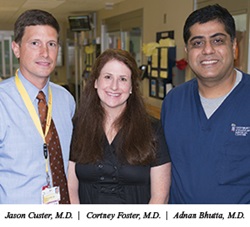Pediatric Intensive Care Unit Boasts Global Impact While Optimizing Outcomes at Home

University of Maryland Rounds features clinical and research updates from the University of Maryland School of Medicine and the University of Maryland Medical Center.
Intended for physicians, Rounds contains contact information to learn more about the clinical and research advances featured in each issue. It is printed three times a year and distributed monthly via email.
With more than 1,100 young patients needing care each year at the University of Maryland Children's Hospital's (UMCH) Pediatric Intensive Care Unit, or PICU, the intensivists who treat the most critically ill children have steadfastly applied their expertise toward optimizing outcomes while also making an impact on a global scale.
Incorporating advanced technologies that support breathing, heart rate, kidney function and other crucial physiological processes during children's medical crises, PICU practitioners have steadily lowered mortality and complication rates at the University of Maryland by using a multidisciplinary approach and a series of quality improvement measures.
Meanwhile, an acclaimed handbook on caring for acutely ill children authored by PICU Medical Director Jason W. Custer, MD, and edited by UMCH colleagues including Cortney Foster, MD, a PICU attending and an assistant professor of pediatrics at the University of Maryland School of Medicine, has made its way to every pediatric clinician in Ecuador.
"I really think the biggest thing that's happened in pediatric critical care is we have a generation of intensivists who are acutely aware of quality improvement, and that, more than any piece of technology, has changed the way we practice medicine," explains Division Head of Pediatric Critical Care Medicine Adnan T. Bhutta, MBBS, who is also an associate professor of pediatrics at University of Maryland School of Medicine. "It's really an all-encompassing unit where we take care of all types of medical and surgical patients ranging from 1 day old to 18 years old. It's a large spectrum."
Teamwork Reduces Complication Rates
Respiratory problems, including asthma, pneumonia or chronic conditions compromising lung function are the top reason young patients wind up in the UMCH PICU. Other children may require cardiac surgery or neurosurgery, suffer from brain disorders such as epilepsy, or have accidently ingested toxic substances, among other issues, Dr. Bhutta says.
Technological advances over the past five to 10 years have led to increasing mechanical assistance available for children in crisis. Ventricular assist devices can keep children alive while waiting for a heart transplant, for example, while ECMO (extracorporeal membrane oxygenation) machines are tapped for heart-lung support while youngsters slowly recover from infections that might otherwise have been fatal.
But beyond technology, Drs. Custer and Bhutta credit the PICU staff's focus on systematically reducing hospital-acquired infections and other common complications by incorporating checklists related to procedures such as central line dressings and urinary catheters.
"A lot of those deaths we used to see in ICUs 15 years ago have been markedly reduced," Dr. Bhutta notes. "Certainly in our PICU and in a large number of PICUs across the country, everyone realizes the importance of teamwork and no one works in isolation."
PICU Handbook Educates South Americans
About 3,000 miles away from UMCH, children in South America are benefiting from a handbook Dr. Custer originally intended for pediatric residents undergoing PICU training. He wrote the hand-held primer as a fellow at Johns Hopkins in 2006, never guessing it would one day help far more than a small circle of pediatricians in training.
Dr. Custer brought it with him when he came to UMCH in 2010, where other faculty members contributed to additional editing. The handbook has been continually edited and updated over the last 6 years with the most recent version resulting from a collaborative effort led by Dr. Foster. The book is still used to help UMCH residents and junior nurse practitioners understand the basics of PICU care. But a physician in Ecuador who spotted the handbook — brought there by yet another physician during an international rotation in South America — asked if she could translate it into Spanish, and the Ministry of Health in Ecuador is now providing the translated handbook to pediatric clinicians throughout the country at no cost.
With 70,000 people displaced by an earthquake in Ecuador this past April, Ecuadoran doctors felt the handbook would be especially useful.
"It certainly was a team effort, and the results were unexpected and gratifying," says Dr. Custer, also assistant pediatric resident program director at UMMC and an assistant professor of pediatrics at University of Maryland School of Medicine. "The goal of anyone in academic medicine is to make an impact outside your sphere of influence. It's a nice way to give back and use your knowledge."
Adds Dr. Bhutta: "University of Maryland is a well-recognized institution, and people know us when we go outside the country. When we have small projects like these that become bigger and help people across the globe, there's no better feeling."
To transfer a patient to the PICU, please contact Maryland ExpressCare for Kids at 1-800-373-4111.
